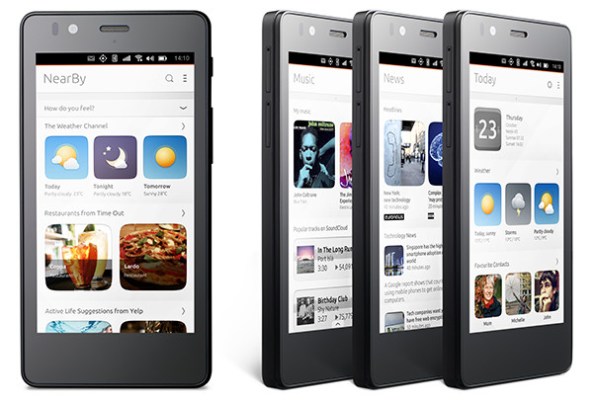A year after it revealed another attempt to muscle in on the smartphone market, Canonical’s first Ubuntu-based smartphone is due to go on sale in Europe in the “coming days”, it said today. The device will be sold for €169.90 (~$190) unlocked to any carrier network, although some regional European carriers will be offering SIM bundles at the point of purchase. The hardware is an existing mid-tier device, the Aquaris E4.5, made by Spain’s BQ — with the Ubuntu version of the device known as the ‘Aquaris E4.5 Ubuntu Edition’. So the only difference here is it will be pre-loaded with Ubuntu’s mobile software, rather than Google’s Android platform.
Canonical has been trying to get into the mobile space for a while now. Back in 2013, the open source software maker failed to crowdfund a high end converged smartphone-cum-desktop-computer, called the Ubuntu Edge — a smartphone-sized device that would been powerful enough to transform from a pocket computer into a fully fledged desktop when plugged into a keyboard and monitor, running Ubuntu’s full-fat desktop OS. Canonical had sought to raise a hefty $32 million in crowdfunds to make that project fly. Hence its more modest, mid-tier smartphone debut now.
On the hardware side, Ubuntu’s first smartphone offers pretty bog standard mid-range specs, with a 4.5 inch screen, 1GB RAM, a quad-core A7 chip running at “up to 1.3Ghz”, 8GB of on-board storage, 8MP rear camera and 5MP front-facing lens, plus a dual-SIM slot. But it’s the mobile software that’s the novelty here (demoed in action in Canonical’s walkthrough video, embedded below).
Canonical has created a gesture-based smartphone interface called Scopes, which puts the homescreen focus on on a series of themed cards that aggregate content and which the user swipes between to navigate around the functions of the phone, while app icons are tucked away to the side of the screen, or gathered together on a single Scope card. Examples include a contextual ‘Today’ card which contains info like weather and calendar, or a ‘Nearby’ card for location-specific local services, or a card for accessing ‘Music’ content on the device, or ‘News’ for accessing various articles in one place.
It’s certainly a different approach to the default grid of apps found on iOS and Android but has some overlap with other, alternative platforms such as Palm’s WebOS, or the rebooted BlackBerry OS, or Jolla’s Sailfish. The problem is, as with all such smaller OSes, it will be an uphill battle for Canonical to attract developers to build content for its platform to make it really live and breathe. (It’s got a few third parties offering content at launch — including Songkick, The Weather Channel and TimeOut.) And, crucially, a huge challenge to convince consumers to try something different which requires they learn new mobile tricks. Especially given that people can’t try before they buy — as the device will be sold online only.
Canonical said the Aquaris E4.5 Ubuntu Edition will be made available in a series of flash sales over the coming weeks, via BQ.com. Sales will be announced through Ubuntu and BQ’s social media channels — perhaps taking a leaf out of the retail strategy of Android smartphone maker Xiaomi, which uses online flash sales to hype device launches and shift inventory quickly. Building similar hype in a mature smartphone market like Europe — for mid-tier hardware — is going to a Sisyphean task. But Canonical claims to be in it for the long, uphill haul.
“We are going for the mass market,” Cristian Parrino, its VP of Mobile, told Engadget. “But that’s a gradual process and a thoughtful process. That’s something we’re going to be doing intelligently over time — but we’ll get there.”
